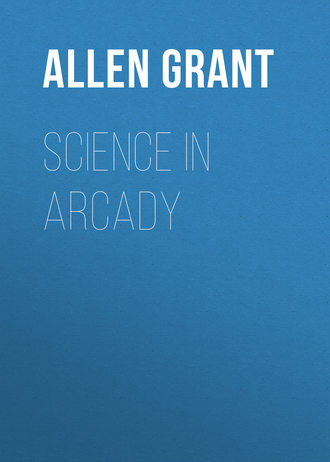 полная версия
полная версияScience in Arcady
Birds, I early noticed, are always great carriers of fruit-seeds, because they eat the berries, but don't digest the hard little stones within. It was in that way, I fancy, that the Portugal laurel first came to my islands, because it has an edible fruit with a very hard seed; and the same reason must account for the presence of the myrtle, with its small blue berry; the laurustinus with its currant-like fruit; the elder-tree, the canary laurel, the local sweet-gale, and the peculiar juniper. Before these shrubs were introduced thus unconsciously by our feathered guests, there were no fruits on which berry-eating birds could live; but now they are the only native trees or large bushes on the islands—I mean the only ones not directly planted by you mischief-making men, who have entirely spoilt my nice little experiment.
It was much the same with the history of some among the birds themselves. Not a few birds of prey, for example, were driven to my little archipelago by stress of weather in its very early days; but they all perished for want of sufficient small quarry to make a living out of. As soon, however, as the islands had got well stocked with robins, black-caps, wrens, and wagtails, of European types—as soon as the chaffinches had established themselves on the seaward plains, and the canary had learnt to nest without fear among the Portugal laurels—then buzzards, long-eared owls, and common barn-owls, driven westward by tempests, began to pick up a decent living on all the islands, and have ever since been permanent residents, to the immense terror and discomfort of our smaller song-birds. Thus the older the archipelago got the less chance was there of local variation taking place to any large degree, because the balance of life each day grew more closely to resemble that which each species had left behind it in its native European or African mainland.
I said a little while ago we had no mammal in the islands. In that I was not quite strictly correct. I ought to have said, no terrestrial mammal. A little Spanish bat got blown to us once by a rough nor'easter, and took up its abode at once among the caves of our archipelago, where it hawks to this day after our flies and beetles. This seemed to me to show very conspicuously the advantage which winged animals have in the matter of cosmopolitan dispersion; for while it was quite impossible for rats, mice, or squirrels to cross the intervening belt of three hundred leagues of sea, their little winged relation, the flitter-mouse, made the journey across quite safely on his own leathery vans, and with no greater difficulty than a swallow or a wood-pigeon.
The insects of my archipelago tell very much the same story as the birds and the plants. Here, too, winged species have stood at a great advantage. To be sure, the earliest butterflies and bees that arrived in the fern-clad period were starved for want of honey; but as soon as the valleys began to be thickly tangled with composites, harebells, and sweet-scented myrtle bushes, these nectar-eating insects established themselves successfully, and kept their breed true by occasional crosses with fresh arrivals blown to sea afterwards. The development of the beetles I watched with far greater interest, as they assumed fresh forms much more rapidly under their new conditions of restricted food and limited enemies. Many kinds I observed which came originally from Europe, sometimes in the larval state, sometimes in the egg, and sometimes flying as full-grown insects before the blast of the angry tempest. Several of these changed their features rapidly after their arrival in the islands, producing at first divergent varieties, and finally, by dint of selection, acting in various ways, through climate, food, or enemies, on these nascent forms, evolving into stable and well-adapted species. But I noticed three cases where bits of driftwood thrown up from South America on the western coasts contained the eggs or larvae of American beetles, while several others were driven ashore from the Canaries or Madeira; and in one instance even a small insect, belonging to a type now confined to Madagascar, found its way safely by sea to this remote spot, where, being a female with eggs, it succeeded in establishing a flourishing colony. I believe, however, that at the time of its arrival it still existed on the African continent, but becoming extinct there under stress of competition with higher forms, it now survives only in these two widely separated insular areas.
It was an endless amusement to me during those long centuries, while I devoted myself entirely to the task of watching my fauna and flora develop itself, to look out from day to day for any chance arrival by wind or waves, and to follow the course of its subsequent vicissitudes and evolution. In a great many cases, especially at first, the new-comer found no niche ready for it in the established order of things on the islands, and was fain at last, after a hard struggle, to retire for ever from the unequal contest. But often enough, too, he made a gallant fight for it, and, adapting himself rapidly to his new environment, changed his form and habits with surprising facility. For natural selection, I found, is a hard schoolmaster. If you happen to fit your place in the world, you live and thrive, but if you don't happen to fit it, to the wall with you without quarter. Thus sometimes I would see a small canary beetle quickly take to new food and new modes of life on my islands under my very eyes, so that in a century or so I judged him myself worthy of the distinction of a separate species; while in another case, I remember, a south European weevil evolved before long into something so wholly different from his former self that a systematic entomologist would have been forced to enrol him in a distinct genus. I often wish now that I had kept a regular collection of all the intermediate forms, to present as an illustrative series to one of your human museums; but in those days, of course, we none of us imagined anybody but ourselves would ever take an interest in these problems of the development of life, and we let the chance slide till it was too late to recover it.
Naturally, during all these ages changes of other sorts were going on in my islands—elevations and subsidences, separations and reunions, which helped to modify the life of the group considerably. Indeed, volcanic action was constantly at work altering the shapes and sizes of the different rocky mountain-tops, and bringing now one, now another, into closer relations than before with its neighbours. Why, as recently as 1811 (a date which is so fresh in my memory that I could hardly forget it) a new island was suddenly formed by submarine eruption off the coast of St. Michael's, to which the name of Sabrina was momentarily given by your human geographers. It was about a mile around and 300 feet high; but, consisting as it did of loose cinders only, it was soon washed away by the force of the waves in that stormy region. I merely mention it here to show how recently volcanic changes have taken place in my islands, and how continuously the internal energy has been at work modifying and re-arranging them.
Up to the moment of the arrival of man in the archipelago the whole population, animal and vegetable, consisted entirely of these waifs and strays, blown out to sea from Europe or Africa, and modified more or less on the spot in accordance with the varying needs of their new home. But the advent of the obtrusive human species spoilt the game at once for an independent observer. Man immediately introduced oranges, bananas, sweet potatoes, grapes, plums, almonds, and many other trees or shrubs, in which, for selfish reasons, he was personally interested. At the same time he quite unconsciously and unintentionally stocked the islands with a fine vigorous crop of European weeds, so that the number of kinds of flowering plants included in the modern flora of my little archipelago exceeds, I think, by fully one-half that which I remember before the date of the Portuguese occupation. In the same way, besides his domestic animals, this spoil-sport colonist man brought in his train accidentally rabbits, weasels, mice, and rats, which now abound in many parts of the group, so that the islands have now in effect a wild mammalian fauna. What is more odd, a small lizard has also got about in the walls—not as you would imagine, a native-born Portuguese subject, but of a kind found only in Madeira and Teneriffe, and, as far as I could make out at the time, it seemed to me to come over with cuttings of Madeira vines for planting at St. Michael's. It was about the same time, I imagine, that eels and gold-fish first got loose from glass globes into the ponds and water-courses.
I have forgotten to mention, what you will no doubt yourself long since have inferred, that my archipelago is known among human beings in modern times as the Azores; and also that traces of all these curious facts of introduction and modification, which I have detailed here in their historical order, may still be detected by an acute observer and reasoner in the existing condition of the fauna and flora. Indeed, one of your own countrymen, Mr. Goodman, has collected all the most salient of these facts in his 'Natural History of the Azores,' and another of your distinguished men of science, Mr. Alfred Russel Wallace, has given essentially the same explanations beforehand as those which I have here ventured to lay, from another point of view, before a critical human audience. But while Mr. Wallace has arrived at them by a process of arguing backward from existing facts to prior causes and probable antecedents, it occurred to me, who had enjoyed such exceptional opportunities of watching the whole process unfold itself from the very beginning, that a strictly historical account of how I had seen it come about, step after step, might possess for some of you a greater direct interest than Mr. Wallace's inferential solution of the self-same problem. If, through lapse of memory or inattention to detail at so remote a period, I have set down aught amiss, I sincerely trust you will be kind enough to forgive me. But this little epic of the peopling of a single oceanic archipelago by casual strays, which I alone have had the good fortune to follow through all its episodes, seemed to me too unique and valuable a chapter in the annals of life to be withheld entirely from the scientific world of your eager, ephemeral, nineteenth century humanity.
TROPICAL EDUCATION
If any one were to ask me (which is highly unlikely) 'In what university would an intelligent young man do best to study?' I think I should be very much inclined indeed to answer offhand, 'In the Tropics.'
No doubt this advice sounds on first hearing just a trifle paradoxical; and no doubt, too, the proposed university has certain serious drawbacks (like many others) on the various grounds of health, expense, faith, and morals. Senior Proctors are unknown at Honolulu; Select Preachers don't range as far as the West Coast. But it has always seemed to me, nevertheless, that certain elements of a liberal education are to be acquired tropically which can never be acquired in a temperate, still less in an arctic or antarctic academy. This is more especially true, I allow, in the particular cases of the biologist and the sociologist; but it is also true in a somewhat less degree of the mere common arts course, and the mere average seeker after liberal culture. Vast aspects of nature and human life exist which can never adequately be understood aright except in tropical countries; vivid side-lights are cast upon our own history and the history of our globe which can never adequately be appreciated except beneath the searching and all too garish rays of a tropical sun.
Whenever I meet a cultivated man who knows his Tropics—and more particularly one who has known his Tropics during the formative period of mental development, say from eighteen to thirty—I feel instinctively that he possesses certain keys of man and nature, certain clues to the problems of the world we live in, not possessed in anything like the same degree by the mere average annual output of Oxford or of Heidelberg. I feel that we talk like Freemasons together—we of the Higher Brotherhood who have worshipped the sun, præsentiorem deum, in his own nearer temples.
Let me begin by positing an extreme parallel. How obviously inadequate is the conception of life enjoyed by the ordinary Laplander or the most intelligent Fuegian! Suppose even he has attended the mission school of his native village, and become learned there in all the learning of the Egyptians, up to the extreme level of the sixth standard, yet how feeble must be his idea of the planet on which he moves! How much must his horizon be cabined, cribbed, confined by the frost and snow, the gloom and poverty, of the bare land around him! He lives in a dark cold world of scrubby vegetation and scant animal life: a world where human existence is necessarily preserved only by ceaseless labour and at severe odds; a world out of which all the noblest and most beautiful living creatures have been ruthlessly pressed; a world where nothing great has been or can be; a world doomed by its mere physical conditions to eternal poverty, discomfort, and squalor. For green fields he has snow and reindeer moss: for singing birds and flowers, the ptarmigan and the tundra. How can he ever form any fitting conception of the glory of life—of the means by which animal and vegetable organisms first grew and flourished? How can he frame to himself any reasonable picture of civilised society, or of the origin and development of human faculty and human organisation?
Somewhat the same, though of course in a highly mitigated degree, are the disadvantages under which the pure temperate education labours, when compared with the education unconsciously drunk in at every pore by an intelligent mind in tropical climates. And fully to understand this pregnant educational importance of the Tropics we must consider with ourselves how large a part tropical conditions have borne in the development of life in general, and of human life and society in particular.
The Tropics, we must carefully remember, are the norma of nature: the way things mostly are and always have been. They represent to us the common condition of the whole world during by far the greater part of its entire existence. Not only are they still in the strictest sense the biological head-quarters: they are also the standard or central type by which we must explain all the rest of nature, both in man and beast, in plant and animal.
The temperate and arctic worlds, on the other hand, are a mere passing accident in the history of our planet: a hole-and-corner development; a special result of the great Glacial epoch, and of that vast slow secular cooling which preceded and led up to it, from the beginning of the Miocene or Mid-Tertiary period. Our European ideas, poor, harsh, and narrow, are mainly formed among a chilled and stunted fauna and flora, under inclement skies, and in gloomy days, all of which can give us but a very cramped and faint conception of the joyous exuberance, the teeming vitality, the fierce hand-to-hand conflict, and the victorious exultation of tropical life in its full free development.
All through the Primary and Secondary epochs of geology, it is now pretty certain, hothouse conditions practically prevailed almost without a break over the whole world from pole to pole. It may be true, indeed, as Dr. Croli believes (and his reasoning on the point I confess is fairly convincing), that from time to time glacial periods in one or other hemisphere broke in for a while upon the genial warmth that characterised the greater part of those vast and immeasurable primæval æons. But even if that were so—if at long intervals the world for some hours in its cosmical year was chilled and frozen in an insignificant cap at either extremity—these casual episodes in a long story do not interfere with the general truth of the principle that life as a whole during the greater portion of its antique existence has been carried on under essentially tropical conditions. No matter what geological formation we examine, we find everywhere the same tale unfolded in plain inscriptions before our eyes. Take, for example, the giant club-mosses and luxuriant tree-ferns nature-printed on shales of the coal age in Britain: and we see in the wild undergrowth of those palæozoic forests ample evidence of a warm and almost West Indian climate among the low basking islets of our northern carboniferous seas. Or take once more the oolitic epoch in England, lithographed on its own mud, with its puzzle-monkeys and its sago-palms, its crocodiles and its deinosaurs, its winged pterodactyls and its whale-like lizards. All these huge creatures and these broad-leaved trees plainly indicate the existence of a temperature over the whole of Northern Europe almost as warm as that of the Malay Archipelago in our own day. The weather report for all the earlier ages stands almost uninterruptedly at Set Fair.
Roughly speaking, indeed, one may say that through the long series of Primary and Secondary formations hardly a trace can be found of ice or snow, autumn or winter, leafless boughs or pinched and starved deciduous vegetation. Everything is powerful, luxuriant, vivid. Life, as Comus feared, was strangled with its waste fertility. Once, indeed, in the Permian Age, all over the temperate regions, north and south, we get passing indications of what seems very like a glacial epoch, partially comparable to that great glaciation on whose last fringe we still abide to-day. But the Ice Age of the Permian, if such there were, passed away entirely, leaving the world once more warm and fruitful up to the very poles under conditions which we would now describe as essentially tropical.
It was with the Tertiary period—perhaps, indeed, only with the middle subdivision of that period—that the gradual cooling of the polar and intermediate regions began. We know from the deposits of the chalk epoch in Greenland that late in Secondary times ferns, magnolias, myrtles, and sago-palms—an Indian or Mexican flora—flourished exceedingly in what is now the dreariest and most ice-clad region of the northern hemisphere. Later still, in the Eocene days, though the plants of Greenland had grown slightly more temperate in type, we still find among the fossils, not only oaks, planes, vines, and walnuts, but also wellingtonias like the big trees of California, Spanish chestnuts, quaint southern salisburias, broad-leaved liquidambars, and American sassafras. Nay, even in glacier-clad Spitzbergen itself, where the character of the flora already begins to show signs of incipient chilling, we nevertheless see among the Eocene types such plants as the swamp-cyprus of the Carolinas and the wellingtonias of the Far West, together with a rich forest vegetation of poplars, birches, oaks, planes, hazels, walnuts, water-lilies, and irises. As a whole, this vegetation still bespeaks a climate considerably more genial, mild, and equable than that of modern England.
It was in this basking world of the chalk and the Eocene that the great mammalian fauna first took its rise; it was in this easy world of fruits and sunshine that the primitive ancestors of man first began to work upwards toward the distinctively human level of the palæolithic period.
But then, in the mid-career of that third day of the geological drama, came a frost—a nipping-frost; and slowly but surely the whole arctic and antarctic worlds were chilled and cramped, degree after degree, by the gradual on-coming of the Great Ice Age. I am not going to deal here with either the causes or the extent of that colossal cataclysm; I shall take all those for granted at present: what we are concerned with now are the results it left behind—the changes which it wrought on fauna and flora and on human society. Especially is it of importance in this connection to point out that the Glacial epoch is not yet entirely finished—if, indeed, it is ever destined to be finished. We are living still on the fringe of the Ice Age, in a cold and cheerless era, the legacy of the accumulated glaciers of the northern and southern snow-fields.
If once that ice were melted off—ah, well, there is much virtue in an if. Still, Mr. Alfred Russel Wallace seems to suggest somewhere that the sun is gradually making inroads even now on those great glacier-sheets of the northern cap, just as we know he is doing on the smaller glacier-sheets of Switzerland (most of which are receding), and that in time perhaps (say in a hundred thousand years or so) warm ocean currents may once more penetrate to the very poles themselves. That, however, is neither here nor there. The fact remains that we of Northern Europe live to-day in a cramped, chilled, contracted world; a world from which all the larger, fiercer, and grander types have either been killed off or driven south; a world which stands to the full and vigorous world of the Eocene and Miocene periods in somewhat the same relation as Lapland stands to-day to Italy or the Riviera.
This being so, it naturally results that if we want really to understand the history of life, its origin and its episodes, we must turn nowadays to that part of our planet which still most nearly preserves the original conditions—that is to say, the Tropics. And it has always seemed to me, both à priori and à posteriori, that the Tropics on this account do really possess for every one of us a vast and for the most part unrecognised educational importance.
I say 'for every one of us,' of deliberate design. I don't mean merely for the biologist, though to him, no doubt, their value in this respect is greatest of all. Indeed, I doubt whether the very ideas of the struggle for life, natural selection, the survival of the fittest, would ever have occurred at all to the stay-at-home naturalists of the Linnæan epoch. It was in the depths of Brazilian forests, or under the broad shade of East Indian palms, that those fertile conceptions first flashed independently upon two southern explorers. It is very noteworthy indeed that all the biologists who have done most to revolutionise the science of life in our own day—Darwin, Huxley, Wallace, Bates, Fritz Müller, and Belt—have without exception formed their notions of the plant and animal world during tropical travels in early life. No one can read the 'Voyage of the Beagle,' the 'Naturalist on the Amazons,' or the 'Malay Archipelago' without feeling at every page how profoundly the facts of tropical nature had penetrated and modified their authors' minds. On the other hand, it is well worth while to notice that the formal opposition to the new and more expansive evolutionary views came mainly from the museum and laboratory type of naturalists in London and Paris, the official exponents of dry bones, who knew nature only through books and preserved specimens, or through her impoverished and far less plastic developments in northern lands. The battle of organic evolution has been waged by the Darwins, the Huxleys, and the Müllers on the one hand, against the Cuviers, the Owens, and the Virchows on the other.
Still, it is not only in biology, as I said just now, that a taste of the Tropics in early life exerts a marked widening and philosophic influence upon a man's whole mental horizon. In ten thousand ways, in that great tropical university, men feel themselves in closer touch than elsewhere with the ultimate facts and truths of nature. I don't know whether it is all fancy and preconceived opinion, but I often imagine when I talk with new-met men that I can detect a certain difference in tone and feeling at first sight between those who have and those who have not passed the Tropical Tripos. In the Tropics, in short, we seem to get down to the very roots of things. Thousands of questions, social, political, economical, ethical, present themselves at once in new and more engagingly simple aspects. Difficulties vanish, distinctions disappear, conventions fade, clothes are reduced to their least common measure, man stands forth in his native nakedness. Things that in the North we had come to regard as inevitable—garments, firing, income tax, morality—evaporate or simplify themselves with instructive ease and phantasmagoric readiness. Malthus and the food question assume fresh forms, as in dissolving views, before our very eyes. How are slums conceivable or East Ends possible where every man can plant his own yam and cocoa-nut, and reap their fruit four-hundred-fold? How can Mrs. Grundy thrive where every woman may rear her own ten children on her ten-rood plot without aid or assistance from their indeterminate fathers? What need of carpentry where a few bamboos, cut down at random, can be fastened together with thongs into a comfortable chair? What use of pottery where calabashes hang on every tree, and cocoa-nuts, with the water fresh and pure within, supply at once the cup, and the filter, and the Apollinaris within?









